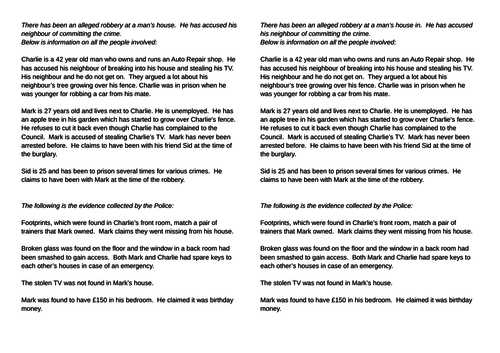




I created these worksheets to support my lessons on Ancient Greece and how they influenced modern day democracy but these sheets could be used as stand alone lessons.
Included:
Sheet with information on the alleged crime and those involved. There has been an alleged robbery at a man’s house. He has accused his neighbour of committing the crime. The accused’s alibi is his best friend , Sid, who has been to prison before. Who will you believe?
Jurors:
Three jurors all of who know one of the people involved. This sheet will help the children to understand the need for an unbiased jury. Children will discuss the jurors and decide whether or not to keep them on the jury
Questionnaire:
I used this with a colleague who had experienced jury duty. They came into our lesson and the children used the questions on this sheet to interview them on their experience.
Statements:
Brief statements from the three people involved. Children can use these to help form their opinions on the accused.
Verdict/Truth:
Most children I have used this lesson with come to the conclusion that Mark (the accused) is guilty. They are always surprised to know that he was set up by the man who accused him.
The children find out that even if Mark was guilty, he would more than likely have walked free due to lack of evidence. This always ignites interesting conversations about how fair our legal system is.
Something went wrong, please try again later.
This resource hasn't been reviewed yet
To ensure quality for our reviews, only customers who have purchased this resource can review it
Report this resourceto let us know if it violates our terms and conditions.
Our customer service team will review your report and will be in touch.
